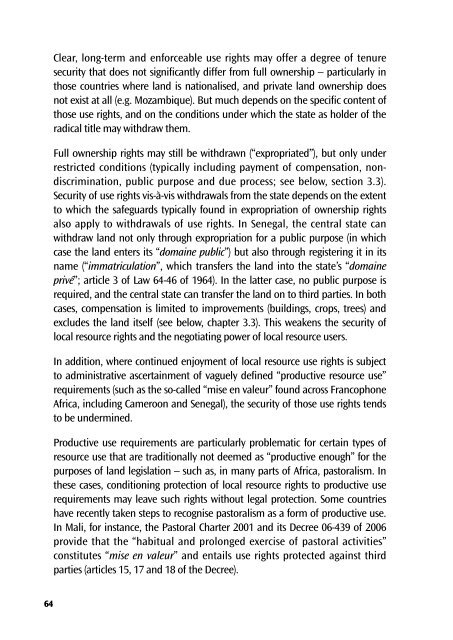Legal empowerment for local resource control
Legal empowerment for local resource control
Legal empowerment for local resource control
Create successful ePaper yourself
Turn your PDF publications into a flip-book with our unique Google optimized e-Paper software.
64<br />
Clear, long-term and en<strong>for</strong>ceable use rights may offer a degree of tenure<br />
security that does not significantly differ from full ownership – particularly in<br />
those countries where land is nationalised, and private land ownership does<br />
not exist at all (e.g. Mozambique). But much depends on the specific content of<br />
those use rights, and on the conditions under which the state as holder of the<br />
radical title may withdraw them.<br />
Full ownership rights may still be withdrawn (“expropriated”), but only under<br />
restricted conditions (typically including payment of compensation, nondiscrimination,<br />
public purpose and due process; see below, section 3.3).<br />
Security of use rights vis-à-vis withdrawals from the state depends on the extent<br />
to which the safeguards typically found in expropriation of ownership rights<br />
also apply to withdrawals of use rights. In Senegal, the central state can<br />
withdraw land not only through expropriation <strong>for</strong> a public purpose (in which<br />
case the land enters its “domaine public”) but also through registering it in its<br />
name (“immatriculation”, which transfers the land into the state’s “domaine<br />
privé”; article 3 of Law 64-46 of 1964). In the latter case, no public purpose is<br />
required, and the central state can transfer the land on to third parties. In both<br />
cases, compensation is limited to improvements (buildings, crops, trees) and<br />
excludes the land itself (see below, chapter 3.3). This weakens the security of<br />
<strong>local</strong> <strong>resource</strong> rights and the negotiating power of <strong>local</strong> <strong>resource</strong> users.<br />
In addition, where continued enjoyment of <strong>local</strong> <strong>resource</strong> use rights is subject<br />
to administrative ascertainment of vaguely defined “productive <strong>resource</strong> use”<br />
requirements (such as the so-called “mise en valeur” found across Francophone<br />
Africa, including Cameroon and Senegal), the security of those use rights tends<br />
to be undermined.<br />
Productive use requirements are particularly problematic <strong>for</strong> certain types of<br />
<strong>resource</strong> use that are traditionally not deemed as “productive enough” <strong>for</strong> the<br />
purposes of land legislation – such as, in many parts of Africa, pastoralism. In<br />
these cases, conditioning protection of <strong>local</strong> <strong>resource</strong> rights to productive use<br />
requirements may leave such rights without legal protection. Some countries<br />
have recently taken steps to recognise pastoralism as a <strong>for</strong>m of productive use.<br />
In Mali, <strong>for</strong> instance, the Pastoral Charter 2001 and its Decree 06-439 of 2006<br />
provide that the “habitual and prolonged exercise of pastoral activities”<br />
constitutes “mise en valeur” and entails use rights protected against third<br />
parties (articles 15, 17 and 18 of the Decree).

















